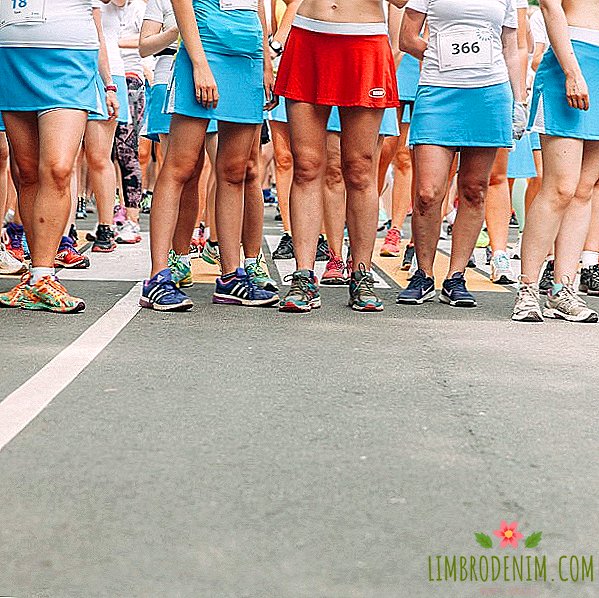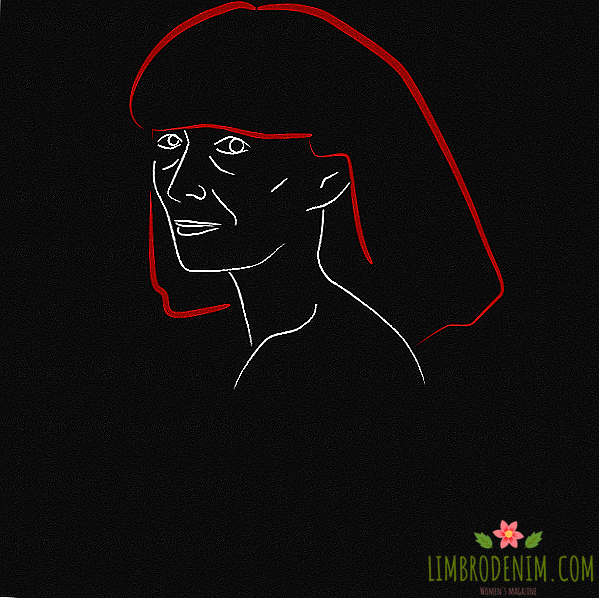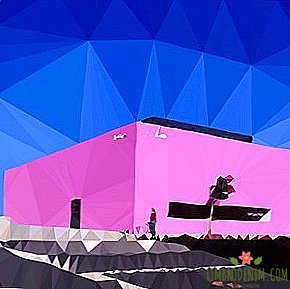DressDoesntSayYes: Race Report on Sexual Abuse
At 9 am on Saturday in Sokolniki not crowded: cafes and kiosks are closed and only a few people walk in the park. I go to the sounds of loud music to the site where participants of the charity race # DressDoesntSayYes ("Clothes are not a sign of consent"), organized by the Sisters Survivor Sexual Assistance Center, gather. This is the first such event of the center; his goal is to raise funds for the work of the Sisters hotline (the center, organized in 1994, now exists solely for private donations and badly needs funding) and draw attention to the problem of accusing the victims of violence. For this, the uniform of the runners was chosen - a blue running mini-skirt (short skirts are often considered clothing that “provokes” the rapist) and a white T-shirt. "In running and living style or length of clothing should not be perceived as an invitation to an uninvited action and, especially, to aggression," - says the manifesto of the race.





I have a strained relationship with sports, but I decided to take part in the Sisters race as soon as I learned about it. They bribed short distances - 1, 3 and 5 kilometers (if the forces are not enough, 3 kilometers can be walked on foot) and a symbolic registration fee - 1300 rubles - which will go to work the hotline of the center.
Every first Russian woman probably faced harassment and violence in one form or another, and almost every time she heard about the notorious “she is guilty!”. I am not an exception: on the eve of the race I was forced to return home late at night alone, although usually a young man meets me. Before the entrance, I was "escorted" by a stranger on a bicycle who insistently wanted to meet and did not react to the direct "no", which I repeated several times. Fortunately, he did not follow me to the porch, but at the end he threw: “What a wicked you are! How hard it will be for you to live!” It is hard to believe that someone still considers harassment as a far-fetched problem, and persistent attempts at acquaintance as a sign of attention.
While at the site in Sokolniki, there are few people, I have time to talk with Ekaterina Bakhrenkova, an employee of the Sisters Center and one of the organizers of the race. She says that because of the failure in the system, more people registered for the event, although initially 350 participants were planned. A couple of days before the race, the organizers allowed to participate in it and without registration - there were so many interested people.
Men run mostly in shorts - a young man next to me says that the organizers did not have the right size skirt
Towards half past nine in the morning, the participants of the race gradually begin to arrive at the site. The overwhelming majority are women, but there are also men; many come in pairs, while others come in whole families, with children, capturing a dog. I am getting acquainted with a married couple - Englishman Michael and Russian Victoria, who were among the first to attend the event. Victoria takes part in the race, and Michael came to support her - later I will see him several times on different parts of the route, looking out for my wife in the crowd of race participants.
Another couple who came to the race is a translator and teacher of Polish Ira and a web specialist at Kaspersky Lab, Alexey, who is warming up in parallel with me during a conversation. Ira says that she learned about the race from feminist publics on Facebook, and Alexey decided to go with her for the company as support. When asked why he is not running in a skirt, Aleksey replies that the skirt "will create mixed signals - how many people will perceive it. I thought about it, but it was too difficult, I decided to abandon this idea."
Men run mostly in shorts - I hear a young man next to me saying that the organizers did not have the right size skirt. Among the participants of the race, Dan Grishin, executive director of a technology company, stands out in a kilt. On the question of whether there are victims of violence among his acquaintances, he replies: "It seems to me that in our country about 80 percent of women suffered in one form or another from the attitude of another part of our country."





At the site, I meet Galim Akhmadullina, one of the race ambassadors, whose photograph adorns the posters. Galima says that six months ago she herself was the victim of an attack. A passing girl came to help her: she heard screams and scared off the assailant. Galima says that after the incident she ran into victimization: “The consequences of physical trauma were easy to survive, but the psychological consequences ... I still go to a psychotherapist, and she tries to explain to me that the fault lies only with the rapist, and still I sit and I think I could do something. "
Galima says she joined the race to show that the girls affected by the problem of violence are much more than it seems, and that everyone can face violence. We are discussing how difficult it is to break out of cultural stereotypes and attitudes that make you a culprit of violence and prescribe to behave in a certain way - not to run around in shorts, not to wear heels and skirts and not to look into the eyes of strangers, otherwise it will be regarded as consent and an invitation to action .
Other run-in ambassadors faced violence: Anastasia Karimova, a civilian activist, a spokeswoman for Transparency International Russia and the creator of the public "Not Mars and Not Venus," tells me that in her life there was an attempt at rape. Galima introduces me to his girlfriend and another ambassador, Lena Kiseleva, who was also attacked by a robber a couple of years ago. Lena says that many, especially young people, do not realize what many minor aspects girls should think about in order to ensure their safety - to the extent that they take with them when they return home late at night, and how the key can help in protecting against robber.
Anna says that she was born in Uzbekistan: “It was believed that if you are in a skirt above your knees, then you are not dressed appropriately. Here everything doesn’t depend on the length of the skirt - just such a culture”
People come to the race for various reasons - someone supports the Sisters Center, someone is interested in the topic of violence, someone is part of an active running community and goes to various sporting events, and someone loves the tradition of charity races. The latter, for example, is the deputy editor-in-chief of RBC magazine, Anfisa Voronina: she is swimming, not running, but loves to participate in charity events and today runs in a T-shirt from another race - “Running hearts”. Participant of the race Maria, the publishing editor of krokha.ru, also speaks about running with meaning. According to her, she has long been following the activities of the Sisters Center, including from personal interests - several of her relatives experienced violence. Maria Anton's husband enrolled in the volunteers and made a surprise to her: until the last moment, she did not know that they would participate in one event.
Many members of DressDoesntSayYes are running in one way or another, but short distances and an important occasion also attract those who do not usually participate in races. I myself offered to take part in the race for my girlfriend, and she came to Sokolniki with her parents and younger sister. Our example is not the only one: later one of the winners of the prize draw, who was called on the stage, admits that she registered to run three kilometers - but unexpectedly ran five for herself.
Most of those with whom I meet while waiting for the race, learned about # DressDoesntSayYes from Facebook or from my friends - most often from those who are somehow familiar with the organizers. A small company of colleagues who came to the race with their children told me about this (“We decided to include them in such activities so that they know what responsibility means”). In response to a question about the topic of the race, one of them, Anna, says that she was born in Uzbekistan: "It was believed that if you are in a skirt above your knees, then you are not dressed appropriately, you can be touched, for example. Here everything is not about the length of the skirt it depends - just such a culture. So you can go very far if you consider that the skirt is short or something else ... This is unacceptable, of course. " “Sometimes it’s impossible not to walk on dark streets. There are dark streets all around,” her colleague adds. “I wish people would hear that it should be safe.” Their colleague Alexey regrets that the event is devoted only to one type of violence and does not take into account, for example, physical and psychological violence. He adds that it would be good if there were more children at such events in order to speak with them on these topics from childhood.





After the warm-up, which Galim directs from the stage, the speeches of the sponsors and organizers and the unplanned performance of the director of the Sisters Center Maria Mokhova, the participants go to the start. I am standing near the end of the column, and I am completely unaware of the organizers' parting words - just a shot signaling the start of the race. As a person far from running, I choose a slow pace, at the level of brisk walking.
Not far from me starts a woman with a stroller, in which her little son sits. She is not the only one who takes part in the race with the child: at the beginning of the column, a man in a bright yellow T-shirt is running, pushing the running carriage with his daughter in front of him. After the race, I learned that his name was Denis and he came to the race with his wife Anya and her little daughter Alice (“Today my daughter supported my mother, and my father supported my daughter — I played the role of a drive. In general, we run for a long time. half-marathon in Paris, still in the mother’s stomach when she was four months pregnant. Then the half-marathon in Italy, on Lake Garda, when she was four months old, was already in this carriage ").
The girls running next to me speak with ease, discussing what it would be like to postpone the beginning of the race - the thermometers in the park show +30. Running through the heat is really not easy - but at least there is no storm promised by the forecast. In a blue skirt, combined with shorts, it is convenient to move, and the crowd of runners in white and blue uniform can be seen from afar. Someone, however, is running in her clothes - one of the participants is wearing a red running skirt and a short sports top, on the other is a bright pink short tutu on top of the running leggings. As soon as the part of those running along the route turns around and runs towards us, the girl next to me starts giving them "five". "Masha, just don't hit her in the face!" - with a laugh screaming her friend.
Participants discuss that it is more difficult for women to learn self-defense because society teaches them to be weak from childhood
Runners are supported by both volunteers and casual viewers. Under the cheers, it is pleasant to run - it is true that the phrase “Why is this walking pace? Let's go faster!” I want to shout: "Are you kidding?" I come to the finish line at about the second third of the participants - the objective result is difficult to determine, because everyone who finishes ran different distances. At the finish line, the volunteers shout: "Rather, we are waiting for you," as they draw a bottle of water. And even though the last hundred meters were not easy, I cannot help but smile. It seems I understand why my friends love to participate in the races.
After the finish and the raffle, a self-defense workshop begins, with about forty women remaining. All of them enthusiastically perform tasks and work out techniques. I take part in one of the exercises: I need to respond to the attacker with a voice, and this turns out to be more complicated than I thought. Instructors say that physical self-defense is needed only in 10% of cases, and in other situations it is possible to cope with a voice; the instructor watching us says that a hysterical cry works well as a means of self-defense. After the master class in the tent-dressing room, the participants discuss that it is more difficult for women to learn self-defense: as they mature, they begin to defend themselves and fight differently than in childhood, because society teaches them to be weak. “Yes, if a man does not dominate, he is considered offended,” says one of the runners thoughtfully.
At the end of the event I once again meet Ekaterina Bakhrenkova. She believes that the race was successful - and I can not disagree with her. "The problem is complicated, and the format is fun - it was very interesting how it will pass," she says. The funds collected at the race - 450,835 rubles - will be enough for two months of the center's hotline. “In general, we are gradually accumulating an airbag,” Ekaterina adds. “We still have some private donations, and one source is not very good for NGOs: if the flow stops, everything will stop. We will apply for grants and implement other projects. "
Whether the Sisters Center will continue to organize such charity events will be shown by time: events of such magnitude require great efforts and resources. But you can help his activities, and not participating in the races. How exactly - you can find out here.
Photo:Alena Vinokurova





